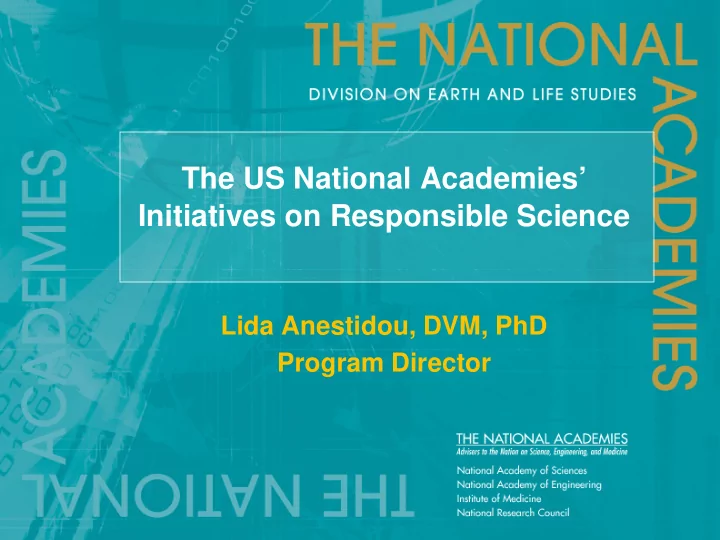

The US National Academies’ Initiatives on Responsible Science Lida Anestidou, DVM, PhD Program Director
Why teach responsible conduct of science (RCS)? What are current methods of teaching and do they work?
The foundations of our approach Workshop on education about dual use issues Warsaw 2009 • Very limited education about dual use issues , either as stand-alone courses or as parts of other courses. • Use responsible conduct of science as the framework for addressing dual use issues. • Build networks of faculty and instructors through “train-the-trainer” programs • Use insights from research on learning and effective teaching to inform development of materials, and approaches to teaching students and preparing faculty
Education: focused on faculty development • Since 2004, the National Academies Summer Institutes offer train-the trainer week-long convocations as a venue to promote discussion, analyze outcomes, and sustain innovation [in the reform of undergraduate biology education] • Participants (i.e., faculty) form working groups to o Learn new teaching techniques o Learn about mentoring and how to develop a related seminar o Develop action plans for transforming the way the subject is taught at their own institution • Goal: prepare a new generation of [biology] teachers
Linking the messages Create a network of educators in the life sciences who can: • Teach about responsible conduct of research. • Use methods of adult teaching /education that promote improved student learning. • Frame the teaching and discussion on biorisk management and research with dual use potential as a matter of professional education and ethics.
Teaching Responsible Conduct of Science Science has no global boundaries , nor should responsible science education http://www.nccu.edu/academics/sc/artsandsciences/globalstudies/index.cfm
Three core themes • The development of professionalism in science. • Conducting research responsibly. • Being part of the responsible scientific community.
Institutes thus far Middle East/North Africa (MENA) • MENA I-Jordan, 2012 • MENA II-Italy, 2014 • MENA III-Turkey, 2015 South and Southeast Asia • Malaysia, 2013 Egypt • Egypt I, 2015 • Egypt II, 2015
Educational Institute on Responsible Science, Kuala Lumpur, Malaysia 2013
Global Efforts Introductory Workshops International Institutes Responsible Conduct of Ethics Science (Algeria) Institute Participants from: Algeria, Egypt, India, Iraq, Jordan, Lebanon, Libya, Malaysia, Morocco, Pakistan, Turkey and Yemen
Schedule of an Educational Institute
Schedule of the workshops
Important parameters for success • Embrace of the concept by academic institutions; avoid one-off situation • Active engagement of academic leaders • Institutional support for the project leaders • Strategic planning for next steps
Recommend
More recommend